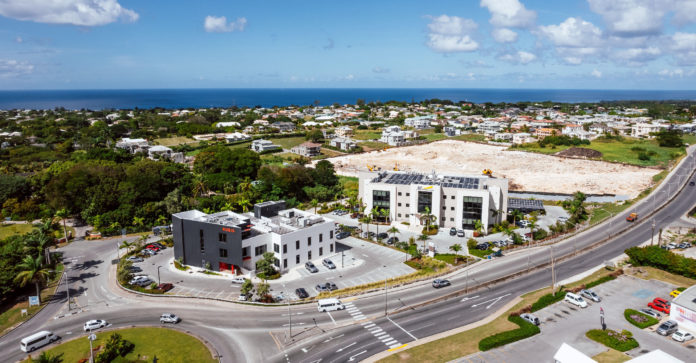
A Class Office Market
Shopping for office space around the world comes with unique challenges. To streamline the tenant’s search, most global realtors will group offices spaces into categories. In Barbados, we traditionally segment office space into three distinct classes: A, B, and C.
In this article, we’ll explore what differentiates each class and dive into how the premium A-class office has been impacted by the pandemic. We’ll also touch on what future opportunities could keep the A-class office space market strong despite current setbacks.
Understanding the different office classes in Barbados
In Barbados different guidelines and criteria allow us to determine whether an office suite or building fits into the A, B, or C category. For example, C-class office spaces are considered to be the lowest classification and are typically older buildings in need of renovations, general upgrades, or newer technology. B-class office spaces are those buildings that are in good condition but may be located outside of central areas or further away from main traffic arteries.
A-class spaces comprise the premium buildings. To qualify for this category, these offices generally must be new or modernized buildings with high-quality finishes and infrastructure. Usually, these A-class buildings are also located in a Central Business District (CBD) or have primary road access. They also include professional building management services and other attractive features such as back-up generators, water storage, elevator access, solar power, building automation systems, as well as modern access control and security technologies.
Examining Barbados’ current A-class office space market
Today, there is approximately 800,000 sq. ft. of A-class office space in Barbados with roughly 44% of that space being owner-occupied. A review of current market rates shows that A-class rents average about $74.00 per square foot per annum inclusive of (“CAM”) Common Area Maintenance.
Interestingly, the current rates compared to those in 2019 show only a nominal reduction of about $5.00 per annum in some buildings. While we would expect a larger reduction given the COVID-19 pandemic and the advent of work-from-home, A-class office tenants would have initially committed to leases of 5 + years. As such, we may not see the real market impact in this class for another 2 to 3 years.
Although rents remain stable, new interest in renting A-class space has declined over the last 12 months. Presently, the A-class market has a vacancy rate of about 15% based on an estimate of the total space available for third-party tenants. This relatively low vacancy may be attributed to landlords offering moratoriums and discounts for specified periods to maintain tenancy.
Looking at how the A-class office market in Barbados will evolve
Historically, the A-class spaces have held their own due to the lack of available inventory. This sector was previously bolstered by large external corporations seeking premium facilities and services for their business operations. In fact, many believe Barbados is the perfect choice for global business operations. In part, this is because Barbados offers over 40 tax treaties, facilitating a globally-competitive tax system. The country also offers a business friendly environment, a well-regulated corporate structure, political and social economic stability, and an excellent quality of life.
However, in this new normal, the office footprint is changing. In the future, demand for the A-class office space may continue declining as businesses allow employees to alternate between remote work and in-office days. Tenants may also need to re-configure existing spaces to facilitate adequate social distancing and meet evolving health and safety compliance requirements.
For landlords, this means competition for discerning tenants will be high. They will need to be. creative in offering amenity-rich spaces that help set them apart in the market.
Leveraging opportunities for a successful post-pandemic office

As the future of office space continues to evolve, there will be an opportunity for landlords to make changes and keep demand high. Some options might be conversion of existing buildings or units into more flexible office spaces, providing open shared work and social areas, and offering additional personal services like on-site gyms, coffee shops, or social programs, etc.
Landlords can also look at implementing new technology enhanced with Artificial Intelligence (AI) to improve the tenant experience and reduce operational costs. AI-based building technologies collect information from various sensors such as access control readers, cameras, Heating, Ventilation, and Air Conditioning (HVAC) systems, and other smart meters, and then automatically make decisions to keep occupants safe and the building running smoothly.
For instance, this might include an elevator system that monitors usage and performance and then automatically updates maintenance schedules when required. There are also HVAC systems that automatically switch on to reach the desired temperature when the first person swipes their access control card at the main entrance in the morning, or lighting systems that turn off when no motion is detected in a meeting room for six minutes.
While the initial investment in AI-based systems may seem costly, the efficiency and returns can allow landlords to recoup the spend in the long term. They might also be able to increase rental rates over time.
Redefining the new office space together
All told, offices spaces will never look the same as they once did. The pandemic has shifted the office space market in big ways, and we may even experience a re-classification of office buildings with the emergence of a new A-plus class.
For now, tenants and landlords will continue working together to redefine the market, and realtors, as always, will be on hand to assist.





Excellent web site you have got here.. It’s hard to find good quality writing like yours these days. I honestly appreciate individuals like you! Take care!!
Great, thanks for sharing this post.Really thank you! Keep writing.
I always look forward to reading your articles. You obviously put a lot of effort into this post, and I appreciate that.